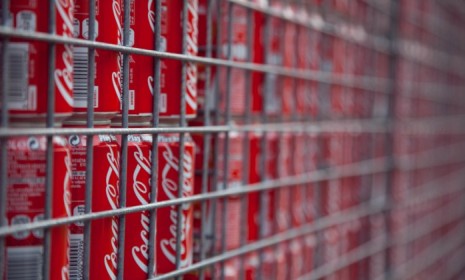Revealed: The secret recipe for Coca-Cola
This American Life claims to have uncovered the "secret formula" behind the country's favorite soft drink. Is it truly the real thing?

A free daily email with the biggest news stories of the day – and the best features from TheWeek.com
You are now subscribed
Your newsletter sign-up was successful
Ira Glass' radio show This American Life claims to have stumbled across a secret that has eluded generations of soft drink manufacturers: The confidential formula for making Coca-Cola. Here, a quick guide to the discovery:
First things first, what is the secret formula?
Every cola from Pepsi to supermarket knock-offs starts with a basic recipe: A mix of coca, citric acid, caffeine, sugar, water, lime juice, vanilla, and caramel. What gives Coca-Cola its unique taste, however, is a compound known as "Secret 7x flavor," which, according to This American Life, is concocted by mixing alcohol, orange oil, lemon oil, nutmeg oil, coriander, nerol, and cinnamon. Five gallons of the basic mix plus two ounces of Secret 7x produces Coca-Cola, claim Glass and company.
The Week
Escape your echo chamber. Get the facts behind the news, plus analysis from multiple perspectives.

Sign up for The Week's Free Newsletters
From our morning news briefing to a weekly Good News Newsletter, get the best of The Week delivered directly to your inbox.
From our morning news briefing to a weekly Good News Newsletter, get the best of The Week delivered directly to your inbox.
How did This American Life discover the recipe?
Reporters at the radio show uncovered a 1979 newspaper article about the soft drink's history, illustrated with a photo of a hand-written copy of the drink's original recipe, created in the 1880s by John Pemberton as a rescue remedy. This American Life simply copied the recipe from the photograph. "This supposedly secret recipe has been hiding in plain sight for 30 years," says Glass. (Listen to the radio program here)
How "secret" was this, then?
Plenty secret. Asa Candler, an early president of the Coca-Cola Company, forbade anyone from writing down the recipe. Pemberton's original book of recipes is now under lock and key, reportedly kept in a bank vault beneath Coca-Cola's Atlanta headquarters. The recipe is considered "one of the biggest secrets in business history."
A free daily email with the biggest news stories of the day – and the best features from TheWeek.com
Could This American Life's revelation hurt Coke's business?
Not likely. Beverage analysts now say that anyone with access to a "sophisticated chemistry laboratory" could figure out what they put in Coke. The one thing rivals can't replicate, says soda expert John Sicher, is Coke's branding. "The value today is the brand, not the formula."
So this is definitely the real thing?
Coca-Cola doesn't think so. "This American Life, along with many other third parties, have tried over time to crack our secret formula," says Coca-Cola spokeswoman Kerry Tressler. "At the end of the day, there is only one "'real thing.'" Still, This American Life gathered a panel of experts and amateurs to taste-test their brew — and reports that many of them "couldn't differentiate it from the real thing."
Should I have a go at making some myself?
Are you kidding? says Kim Conte at The Stir. "Just reading the ingredient list is [exhausting] enough to make you want to buy a can of Coke for the caffeine boost alone." It does sound like "a lot of work for something we can all buy for less than a bottle of water," says Wall Street Cheat Sheet. And if you're thinking of selling your home brew to compete with Coke, then "think again." The company's "army of lawyers" won't let you get far.
Sources: This American Life, Atlanta Journal-Constitution, Time, Wall Street Cheat Sheet